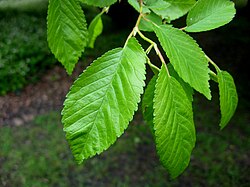Biology:Ulmus minor 'Boissieri'
| Ulmus minor 'Boissieri' | |
|---|---|
 Leaves of 'Boissieri', Sir Harold Hillier Gardens, UK | |
| Species | Ulmus minor |
| Cultivar | 'Boissieri' |
| Origin | Iran |
The Field Elm cultivar Ulmus minor 'Boissieri' (Persian: نارون برگریز or نارون گلپشهای), found in Iran and identified by Irina Grudzinskaya as the species U. boissieri in 1977.[1][2] The tree is endemic to the Zagros forests, with Quercus brantii, Celtis australis, Platanus orientalis, Fraxinus sp., and Cerasus mehaleb.[3][4] The tree is also found in the provinces of Kermanshah (Qasr-e Shirin, Bisotun) and Kerman.[5]
Richens however, treated U. boissieri as Ulmus minor.[6] By the proposed rule that known or suspected clones of U. minor, once cultivated and named, should be treated as cultivars, the tree would be designated U. minor 'Boissieri'.[7]
Description
'Boissieri' is easily distinguished by its small leaves and fruits. The ovate, toothed leaves are 1.5 – 3 cm long, 1.2 – 2 cm broad, typically asymmetric at the base, the upper surfaces glabrous. The leaf veins number from 8 to 12; the petiole 2 – 3 mm long. The perfect apetalous wind-pollinated flowers are minute; the suborbiculate samarae 7 – 9 mm in diameter, with the seed located in the centre.
Pests and diseases
Not known.
Cultivation
Four examples of 'Boissieri' are grown at the Sir Harold Hillier Gardens, UK.
Accessions
Europe
- Sir Harold Hillier Gardens, Ampfield, Hampshire, England. Acc. no. 2001.0188, 4 trees wild collected in Iran by D & S Pigott 2000. Plant Centre Field, marked only as Ulmus minor, Iran.
Synonymy
- Ulmus campestris Huds. var. microphylla Boiss.
- Ulmus microphylla Pers.
Etymology
The species is named for Pierre Edmond Boissier (1810-1885), Swiss botanist and explorer who collected many plants in western Asia.
References
- ↑ Grudzinskaya, I. A. (1977). The new elm species - Ulmus boissieri. New species of Ulmaceae from Iran. Botanicheskii Zhurnal, 62. Komarov Bot. Inst., Acad. Sci., St. Petersburg, Russia.
- ↑ "Plant Name Details for Ulmus boissieri". IPNI. http://www.ipni.org:80/ipni/idPlantNameSearch.do?id=837116-1&back_page=%2Fipni%2FeditSimplePlantNameSearch.do%3Ffind_wholeName%3DUlmus%2Bboissieri%26output_format%3Dnormal. Retrieved October 20, 2009.
- ↑ Jahan Bazi Goujani H., Heydari, H., Sagheb Talebi Kh., Khatamsaz, M. (2003). Site demands of Ulmus boissieri in Bazoft Tangehoonii Chahar Mahal-va-Bakhtyari Province. Iranian Journal of Forest and Poplar Research, 2003; 11(8):1-57, Iran.
- ↑ Parsa, A. (1950). Flore de l'Iran, 4.
- ↑ Mozaffarian, Valiollah (2005). Trees & Shrubs of Iran. p. 958. ISBN 964-8637-03-2.
- ↑ Richens, R.H. (1983). Elm. Cambridge University Press. p. 279. https://books.google.co.uk/books?id=0g49AAAAIAAJ&pg=PA279#v=onepage&q&f=false.
- ↑ Coleman, Max (2002). "British elms". British Wildlife 13 (6): 390–395.
External links
- Template:Muséum national d’Histoire naturelle, Paris (France) Sheet labelled U. campestris, field elm specimen similar to 'Boissieri', Astarabad, northern Persia (1901)

